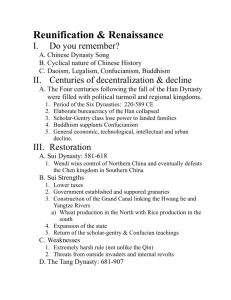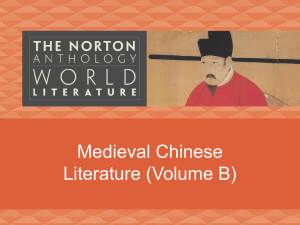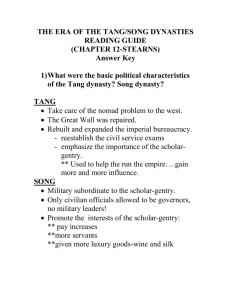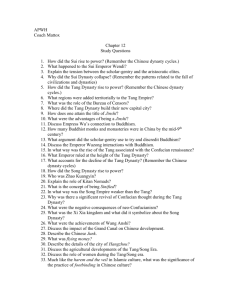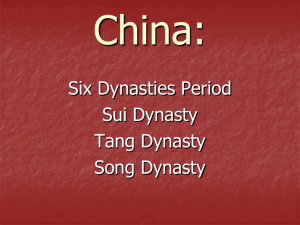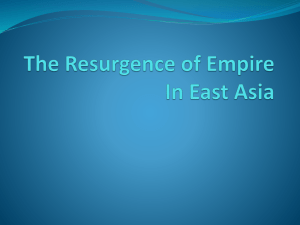Chapter 12 - Crawfordsworld
advertisement
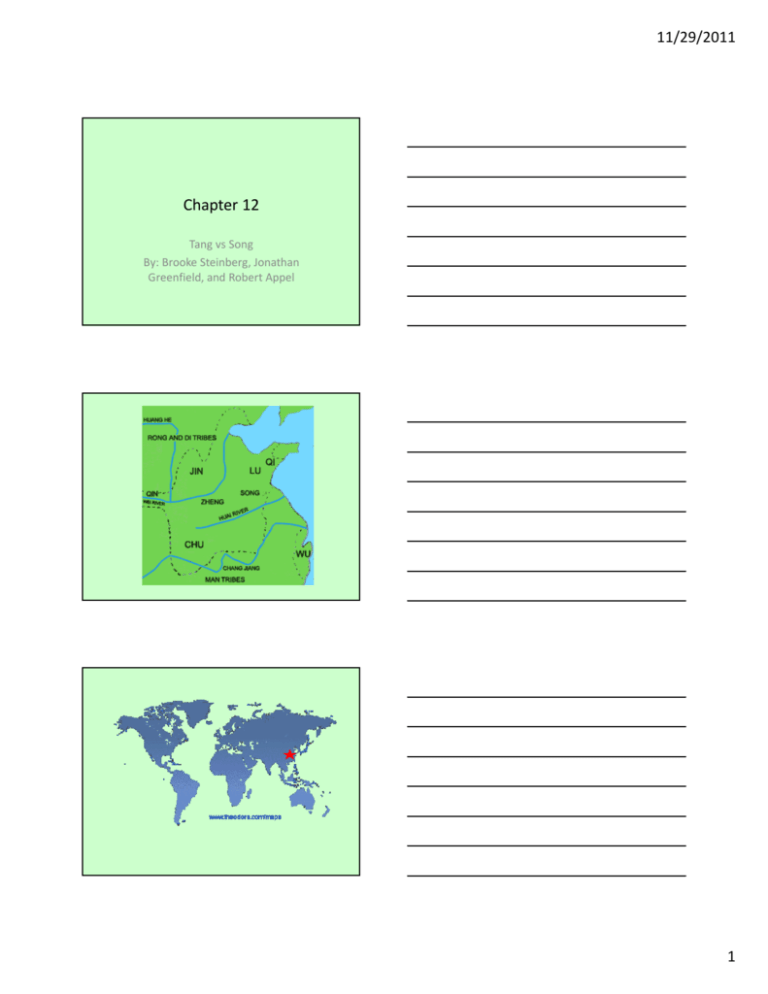
11/29/2011 Chapter 12 Tang vs Song By: Brooke Steinberg, Jonathan Greenfield, and Robert Appel 1 11/29/2011 Vocabulary • Li Yuan – the first emperor of the Tang dynasty • Ministry of Rites – administered examinations to students from Chinese government schools or those recommended by scholars • Jinshi – title granted to the students who passed the most difficult Chinese examination; became eligible for high office • Pure land Buddhism – emphasized salvationist aspects of Chinese Buddhism; popular among masses of Chinese society • Chan/Zen Buddhism – stressed meditation and appreciation of natural and artistic beauty; popular with members of elite Chinese society Vocabulary • Empress Wu – Tang ruler in China; tried to elevate Buddhism to state religion • Wuzong – Chinese emperor of Tang dynasty who openly persecuted Buddhism; reduced influenced of Chinese Buddhism in favor of Confucian ideology • Zhao Kuangyin – founder of Song dynasty; failed to overcome northern Liao dynasty • Liao dynasty – founded by nomadic Khitan people; maintained independence from Song dynasty • Tangut – rulers of Xi Xia kingdom of northwest China; one regional kingdoms during southern Song period Vocabulary • Jin – Kingdom north of the Song Empire • Grand Canal – built during Sui dynasty; designed to link original centers of Chinese civilization on the north China plain with the Yangtze river • Junks – Chinese ships with watertight bulkheads, sternpost rudders, compasses, and bamboo fenders • Flying money – Chinese credit instrument that provided credit vouchers to merchants to be redeemed at the end of the voyage 2 11/29/2011 Tang Dynasty • • • • • • • Emperor Elite families Scholars Soldiers Merchants Peasants Patriarchic society Confucianism • Confucian ideas played roles in rebuilding bureaucracy • Emperors trained state officials and educated them in Confucianism Invasions • Chen Kingdom split because of attacks by Wendi’s armies forming the Tang Dynasty • Nomadic people seized large sections of north China plain • Tang armies conquered into Central Asia as far as Afghanistan • New capital at Chang’an 3 11/29/2011 Political System and Power • Well educated bureaucracy • Tang tried to rebuild and expand the bureaucracy • Aristocratic control declined and their role in history reduced • Power was shared by a succession of imperial families and bureaucrats • Executive department ran empire Economics • Established granaries • Tang armies recruited from Turkic nomads • Taxes were lowered • Peasants were taxed with a portion of their crops Education • Tang were educated hoping to adapt Chinese culture • Ministry of Rites 4 11/29/2011 Buddhism • During the Tang dynasty, it had political and social influence • New forms of Buddhism: – Zen (Japan): stressed meditation and appreciation of artistic beauty – Chan (China): stressed meditation and appreciation of artistic beauty – Pure Land: stressed salvationist aspects • Buddhists began to set up monasteries Buddhism (cont.) • Daoists and Confucian rivals became upset with the popularity of Buddhism • Confucian scholars said Buddhism posed a fundamental economic problem to the imperial order • Religious lands and workers cannot be taxed • Emperor Wuzong openly persecuted Buddhists, destroyed shrines, and forced monks to return to civilian lives Collapse of Tang • General weakening of the imperial control • Tang emperor delegated resources and political power to regional commanders • Nomads used the political divisions to gain entry to the empire and overtake large areas • Bad economic conditions led to many revolts, most led by peasants 5 11/29/2011 Restoration of Empire • 1960 - Zhao Kuangyin tried to unite China under a single dynasty • Founded Song Dynasty • Paid tribute for protection to Liao dynasty • In order to prevent the diffusion of power, only civil officials could govern and military commanders were rotated Education of Song Dynasty • An importance was put on education in the Song dynasty • Every 3 years exams were given at 3 levels: district, provincial, imperial • A revival of Confucian ideas had scholars trying to recover long lost texts and setting up libraries Song Ideas • Adapted the idea of mutual divorce and arranged marriages • Created junks from the Islamic boats • Developed painting and poetry • Started using flying money • Gave cheap loans 6 11/29/2011 Invasions • The Tangut tribe established a kingdom on the northern border • Paid tribute for protection • Jin invaded and overthrew the Tangut • Forced the Song into southern China • Divided northern and southern China • Discovered fertile land Economic Growth • Developed the grand canal • Started producing rice • Silk routes reopened • Offered peasants equal land opportunities • Population started to grow Political Reform • Wang Anshi created multiple reforms • Encouraged agricultural expansion and taxes • Reason for economic growth and development • Emperor changed and reforms were thrown out • Empire started to decline 7 11/29/2011 Collapse • • • • • Population grew too rapidly Army became too expensive Paid for scholastics instead of fortifications Growing power of the Jin Expensive world exploration AP Questions 1. The era of the Tang and Song rule is called the “golden age” of China because… a) It is the only period of Chinese rule in which foreign trade and ideas had little influence b) The Chinese abandoned naturalistic subjects like landscapes in favor for more “modern” abstract, non-representational art c) The Chinese government seized the wealth and land controlled by Buddhist monasteries d) This was the era of the discovery of explosive powder, the abacus, moveable type, and the first use of coal for energy AP Questions 2. The primary function of the scholar-gentry class in Tang and Song China was… a) To teach the Confucian-based university system b) To spy on the land-based elites in the distant provinces c) To administer the imperial, provincial and local governments d) To create innovative scholarship, artwork and technology advances 8 11/29/2011 AP Questions 3. Why did Buddhism become a significant belief system in Tang China? a) Confucian scholars preferred it to Islam, which was banned as a foreign religion b) The scholar-gentry class embraced it as a means of insuring their dominance over women c) It offered social opportunities to commoners, to women, easily mixed with Daoist and Confucian ideas, and had royal patronage d) It was brought into China by humble slaves whose behavior the Chinese admired AP Questions 4. Tang military expansion into central Asia… a) Led to constant warfare between the Chinese and the Muslims b) Promoted renewed commercial contacts between China and west Asia c) Obtained land to settle large Chinese population surpluses d) Was easily defeated by the Turks and other pastoral nomads AP Questions 5. What were the long-term consequences of new maritime technological advances such as the sea-going “junk” and the magnetic compass? a) A renewed focus on engineering and scientific work in the universities b) Combined with the Grand Canal, they dramatically increased north-south trade within China c) They facilitated dramatic increases in overseas trade in the eastern hemisphere d) The scholar-gentry class became worried about the power of the rising merchant-class in the coastal urban areas 9 11/29/2011 AP Questions 6. The Tang rulers were able to control potential nomadic threats to China by… a) Bribery b) Playing one nomadic group against another c) Settling the nomads within the Chinese borders on land to farm d) Intermarriage between the nomadic and Chinese ruling families AP Questions 7. Which sect of Buddhism became popular in China for its focus on prayer and personal salvation? a) b) c) d) Pure Land Chan Tibetan Mahayana 10

